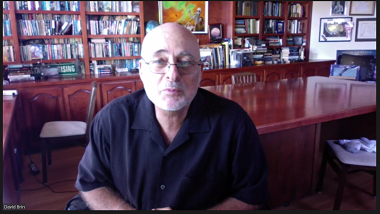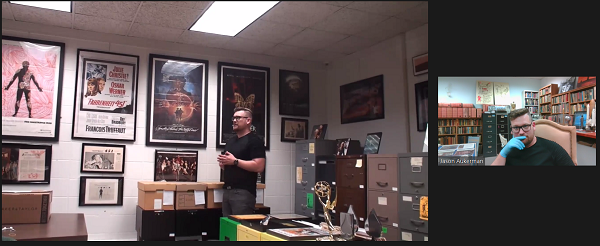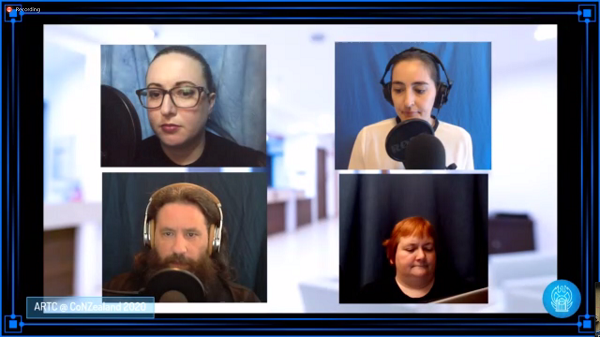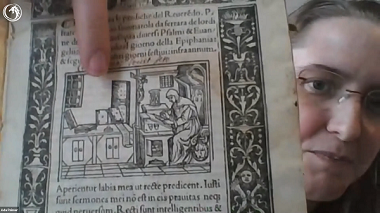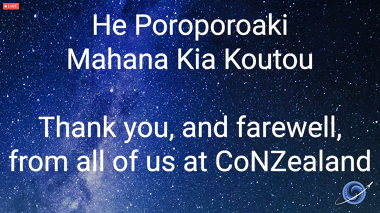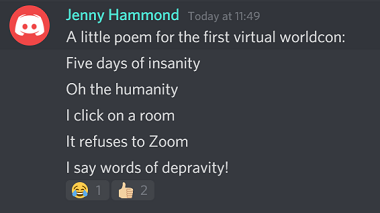Review of 'CoNZealand - The 78th World Science Fiction Convention'
When attending last year's World Science Fiction convention (Dublin 2019: An Irish Worldcon I vowed to attend the following year's convention to be held in Wellington, New Zealand. Of course, the dream of travelling to New Zealand was destroyed with the Coronavirus epidemic. On March 25th they tweeted:
We had already booked our flights, the hotel and, of course, our attending memberships but this was never meant to be. By the time the convention arrived our flights had been cancelled and we received a full refund. I paid the final instalment of my membership choosing to pay the full (NON-virtual) attending membership fee to help out the organisers a bit more but my companion decided to cancel entirely. So, with this I still had to stay up all night to attend the various talks…so jet lag without the jet.
How did it work?
Held from 29 July to 2 August 2020, the 78th World Science Fiction Convention consisted of several web sites and computer software tools. A “Grendine” site at https://sites.grenadine.co/sites/conzealand/en/conzealand containing a list of the programme items (and signups), a “Discord” server that provided virtual (typed/voice) chat rooms that served like a virtual hallway and follow-up to the programme items (you needed to install the Discord software onto your computer to access this), a general web site containing links to recordings as well as the virtual “Dealers Hall” at https://virtual.conzealand.nz/ and https://www.zoom.us calls for each of the session (linked to from the programme list). As you might expect, there were a number of teething problems with all of this including people not being able to get Zoom to work correctly, an audio echo on the Hugo's zoom call, etc but for those most part things went remarkably smoothly. The convention volunteers did a remarkable job of dealing with issues very quickly which was demonstrated in the “Ops” Discord channel that I regularly monitored (chiming in where I could to lift some of their load).
What did you attend?
There were 612 items on the programme spread over 5 days (the last day, Sunday, was only half a day) with, as normal, many time slots having multiple items I wanted to see however one of the benefits of the technology is that most (though not all) of the items were recorded so I was able to watch them later. Most of the items were 50 minutes long beginning at the top of the hour which allowed 10 minutes between each to get ready for the next (the major events, of course, were longer).
So, I attended the following sessions and, yes, I was busy and, yes, there was a huge diversity in the topics…(“[WATCH]” indicates those that I did not watch live but rather the recording).
Wednesday
- Future Laws - A discussion featuring both authors and legal professionals about what future laws might have to deal with. Takeaways include the idea that laws are often reactive rather than proactive but this may need to change in the future to keep pace with the rate of change (or at least the time between laws being created and when they are needed must be decreased). An interesting point was raised that perhaps if technology is, in itself, moral it removes the necessity of law?
- Opening Ceremony - A nice welcome to the convention including footage of the inside of the hall where we all should have been…
- SF and Fantasy of Australia - Started about 20 minutes late this panel featured several Australian including one of my favourites Sean McMullen. The panel concluded that in the NZ/Australia area the small/vanity press market is booming. Self-publishing is great though more demanding on the author.
- The Art of the Review - Another late start this panel featured a number of book reviewers with loads of experience. The conclusions were that reviewers are there to help the reader decide whether or not to read the book and should not simply repeat the plot. Reviewers should disclose any bias so the reader can take this into consideration and the reviewer should also know their limits, perhaps linking to others that do not have such limits. Opinion is NOT the same as literary criticism (my reviews are more of the former, and I make no secret of this).
- The Atlanta Radio Theatre Presents “Omnilingual” and other SF Radio Plays - Three audio plays by the Atlanta Radio Theatre consisting of a pre-recorded video of the actors saying their lines and imaginative backgrounds. Really fun.
- ISS - Still there - Despite only “Space Geek” “Matthew Pavletich” showing up from the three panellists and beginning 20 minutes late Matthew managed to convey that the International Space Station is still operating though things like thermal metal fatigue (due to being continuously exposed to cycles of 45 minutes in the heat of the sun and 45 minutes in the deep cold of space) will eventually cause the station to be beyond repair. In recent years they have augmented the solar capacity of the station and it is still being used. There is a Chinese space stations in the works…
- Can Living in a Small Space on Earth Prepare You for Living in Space? - An interesting panel that included a panellist that was in an Earth-based Mars habitation project (David D. Levine). The general conclusion was that yes, a small space can prepare you for some of the aspects of living in space. One of the notable comments was about the condensation and bacterial growth that features in both. Psychological conclusions include providing the ability for people to get away from one another (have their own personal space), having a group AND personal professional purposes, as well as have personal pursuits that can be followed. Crew honesty is hugely important as is having a leader to be able to make decisions rather than degenerate into lots of talk (sometimes a quick decision is necessary). Improvisation is commonplace and lots of time is spent on maintenance.
Thursday
- Recent SF and Fantasy on TV: Beyond the Usual Suspects - Always useful to attend such a panel to get an idea of what you may have been missing that deserves your attention. Particular highlights of the panel were “Dark” (German SF series on Netflix, English dub is very good), “Tales from the Loop” (SF series, Netflix, stunning visuals and very “trippy”), “Watchman” (TV series), “Westworld” (TV series), “Umbrella Academy” (TV series, Netflix), “Steven Universe” (US animation series) and “Memories of the Alhambra” (a K-drama TV series). A lively debate and helpful discussion.
- Reading: Joe Haldeman [WATCH] - This panel (which I watched a recording of) started extremely late leaving only about 15 minutes for the reading by the venerable Hard-SF author Joe Haldeman well known for Hugo-award winning “The Forever War”. Very good with Joe being helped along by his wife. The session was slightly distracting as an open Zoom call with many on video doing other things while listening…
- Special Effects in Feature Films: The Evolution from Willis O'Brien to Industrial Light and Magic and Weta - An amazing insights into special effects from professionals from two powerhouses of the industry, “Industrial Light and Magic” (US) and “Weta Workshop” (New Zealand, who created the “Lord of the Rings” Peter Jackson films). They played tribute to the master of old-school physical effects Willis O'Brien. Covid simply accelerated a process already underway in the industry of working from home but has not slowed down the work (though there are aspects of production/IP security that are tremendously important). Interestingly, I learned all Weta workers are contractors and that it is always a team working on effects…it is never one individual. As far as advice to those seeking to enter the industry: It is all about “having fun”. “Never stop making the things” - Don't think you need to be perfect. Just keep improving.
- Staying Closer to Home: Science Fiction in the Solar System - Generally this discussion focused on keeping the science real in SF set in our solar system though the panellists admitted that this often exposed them to being “fact checked” by readers on every technical detail. There is a Launchpad Workshop for writers to help them get the facts correct that includes scientists. The discussion eventually concluded with recommendations from the panellists including “A walk in the sun” by Geoffrey A. Landis and they also recommended works by hard-SF writer Andy Wier (known for his novel “The Martian”, which was turned into a film staring Matt Damon).
- The Real Dirt on Exoplanets - An interesting discussion featuring Dr. Gerard van Belle (astronomer from the Lowell Observatory) who explained the technology used to detect planets orbiting other stars. Recently the opinion appears to be that most stars have planets; those without are far rarer. There are three main methods used for planet detection: Radial velocity (spectrum line shift), transit detection (brightness dip when looking at star), and, now, direct imaging (literally seeing the planets, such as circular shadows in the image of the star). We are easily able to detect planets orbiting either far out or close by however it is those in the middle (generally the “habitable” zone) that are more difficult to detect. The nearest star to our solar system, Proxima Centauri, a triple-star system, has a planet orbiting in the “habitable” zone but it is too close to the suns so may by baked with heat and radiation…so not so good for life.
- Ray Bradbury Centennial [WATCH] - Live from the Ray Bradbury Center in Indianapolis, Indiana (where the staff were forced to self-isolate for two weeks before participating in this panel due to Covid) the director, Jason Aukerman, provided a good overview of the life of SF author Ray Bradbury, including his start selling newspapers in high school and spending afternoons in the public library reading up on the subjects he grew to love. On the topic of his famous book “Fahrenheit 451”, he said that in opening a book you can commune with the author. Burning a book is burning the ideas it contains. Author “Niel Gaiman” in his introduction to the book said “Fiction is a lie that tells the truth over and over”. The science in Bradbury's books was never the focus of the stories, the people and implications were. The center is open to the public and tours are available. There is also The Ray Bradbury Experience (in Illinois) that share the center's goals.
- Cory Doctorow and Ada Palmer discuss censorship and information control - An interesting conversation from a SF author (and activitist), Cory Doctorow and SF author/historian Ada Palmer. Both talked a mile a minute but had some very interesting points including:
- Censorship shifts to the latest method of information dissemination
- “Inaction is a form of action”
- Censorship is not propaganda but very related…
- Post office is a source of censorship; It is easier to reuse existing structures rather than create a new one
- Censorship is only bad when done by government…but, regardless, censorship is censorship so we need to be vigilant as censorship is the concealment of the truth
- SF is a way of circumventing censorship; Censors are lazier about some elements of literature as the audience is so narrow there no point in censoring…
- In the 1950s TV animation series “Rockie and Bulwinkle” the producers avoided censoring by delivering the tapes to the studio minutes before they were to be aired…
- Stunts in SF Films and TV Shows - This was a really fun and interesting talk from New Zealand stunt performer/trainer “Peter Hassall” who discussed being a stuntman and showed the various protective equipment and props they use (which are often quite realistic). He indicated that conflict is the essence of drama so stunts/violence will always feature. SF film stunts generally involve wire-work and/of elements of super-strength. He told us that he believed the sequence from “The Thing from Another World” where a stuntman was on fire for many minutes was the scariest ever…Book recommendation: “Space Odyssey” (recent book about the making of “2001: A Space Odyssey”)
- A Chat with Bob [Silverberg] and George [R.R. Martin] - An informal chat between two of the old guard SF authors, Robert Silverberg and George R. R. Martin (toastmaster for the convention and well-known author of the Game of Thrones). They met together for Thursday dinner at every WorldCon so this Zoom call was a replacement for that (with a much larger audience). Most of the conversation seemed to focus on the loss of friends over the years and the camaraderie of the WorldCon experience that has changed over the years due to their now massive size. The Hugos used to be given out in a dinner banquet with tickets costing $1 (with the doors opened after dinner to anyone who wanted to see the awards handed out). Bob never watches TV so could not comment on George's successful Game of Thrones series. The talk was a bit depressing but interesting to listen in on…
- SETI and the Mind of the Alien - A presentation from David Carmel, a Senior Lecturer in Psychology at the University of Wellington which delved into the identification of alien intelligence. We are looking for evidence of “agency” when searching. Though I missed the start of the presentation, he pointed out that aliens might not be conscious but this does not meant they are not aware. Arbitrary (symbolic) content that represents something else is likely a strong indication of intelligence however, we as humans, are limited in searching for intelligence as we are looking for what we believe is meaningful (we are biased). Interestingly he pointed out that there is experimental evidence that patients in a vegetative state are actually aware of what is going on around them so this may impact the way they are cared for. Recommended reading: “Solaris” by Stanisław Lem (see my review of the play here.
- How to End the World on $500 - A fun panel featuring several SF authors including Dr Craig Cormick, David Brin, Julie Czerneda and G. Dvid Nordley that discussed how it might be possible to destroy the world with only $500. The initial obvious conclusion was to manipulate others to do this but then a few other options came to the minds of the panellists: Use CRISPR to alter the human genome with a fatal flaw (may have to wait for costs to decrease); Go back in time and invest the money needed to both destroy the world and provide the funds to build a time machine. An interesting digression was into the idea that SF is an extrapolation of our history into the future and that the greatest SF is self-preventing (!). Likely humanity will find a way to stop annihilation so it will be difficult to destroy it. Anecdote: Mid-July there was multi-day power failure on eastern seaboard so Torontians put BBQ in street and cooked food that was going to rot for anyone…Recommended reading: “Earth Abides” (1949) by George R. Stewart.
- Terraforming and Alien Life: A Biochemist's Perspective - I missed a few minutes from the start of this talk from Stephen Mulholland, who has a PhD in Biochemistry and Molecular Biophysics, now farming and “…researching issues of animal cognition, morbidity/mortality, and how to improve animal welfare”. The talk was extremely interesting (and I have been in contact with him since to follow-up on some questions) and touched on how we would be able to identify (or not) alien life given our sample size of exactly one (Earth carbon-based life). For terraforming (converting an alien planet so Earth life could comfortably live there) we would need to take into consideration any existing alien biochemistry and it's compatibility with human physiology. “Close but not quite right” can be catastrophic (food could be toxic, planting crops may not work either since dirt is complex, alien life might not have the same chirality, or biological “handedness”, etc). The deadliest thing might not be big fauna but rather the microscopic. We still do not understand our biosphere so how soon would we understand an alien one? Would purging life make it easier? Probably make it worse because it may be difficult to wipe all life, destroying processes to make O2…Perhaps we could tweak earth biology to adapt? We would need to have a large variety of earth organisms to fully terraform the alien planet. In summary, terraforming will likely take a very long time and any existing biological constituents may be the biggest obstacle.
Friday
- COVID-19: A Great Filter? - Featuring three writers and an astronomer, this talk pretty much dismissed the idea of the existing pandamic as being a great filter given how previous pandemics ultimately actually made very little impact on human society. If anything pandemics are an un-even filter and no disease is ever universally fatal (even nuclear war would not destroy the world, there would be surivors). It was suggested that: Is it possible that events like the plague actually provides the opposite of a great filter, actually stimulating things? There was even the comment that COVID has been a POSITIVE event in how it has shown how humanity has risen to the challenge of the pandemic. COVID is a wake-up call that may lead towards more economic resilience in the future. Interestingly, in nature viruses generally adapt to NOT be fatal to their hosts in order to survive so the tenancy is towards non-fatality. Perhaps masks will be considered a normal part of clothing? Recommended reading: “Station 11” by Emily st. John Mandel.
- Masquerade - A traditional Worldcon event where fans show off their costuming skills. This time they accepted video entries that were then judged with the winning entries shown during this session. The costumes were certainly quite good but perhaps not as impressive as previous years though, to be sure, the winners certainly were deserving. At only 24 minutes long the video was also far shorter than a normal Masquerade.
- A Fireside Chat with Artist Guest of Honour Greg Broadmore [WATCH] - Greg Broadmore is a man of extraordinary artistic talent. In this interview with convention co-chair Norman Cates, we learned that Broadmore has been an artist with Weta Workshop for about 18 years and has been an artist all his life though he did spend a number of years homeless before finding his place in the world. He did a lot of work on the dystopian SF film “District 9” (see my review here though lamented that about 99% of an artist's work on films generally is thrown away. He has spent a lot of time heading up the video game division of the “Weta Workshop”, “Weta Games” collaborating with “Magic Leap” on the development of an augmented reality game based on his “Dr Grordbort” world of steam-punk aesthetics. His advice to would-be artists: Find your own way; Mistakes are what make you as an artist and help develop your personal style; Any pursuit of perfection is folly; Collaboration has many benefits and learning opportunities.
- The Second Golden Age: SF of the 1960s - This panel consisted of several contemporary SF authors and scholars but also Robert Silverberg, who actually was an author in the 1960s. According to Silverbert the 60s renaissance actually only really got going towards the end of the 1960s. Those hard SF authors wanted the US to be in Vietnam but the more literary authors wanted out (author Judith Meril left the US in protest over their involvement in the war). After Star Wars (1977), nothing was the same with fans demanding more from their SF. Recommended reading: “A Dying Earth” by Jack Vance.
- Old New Writers - This panel was based on the Worldcon traditional “New Writers” panel which, over the years, featured the same people, including Joe Haldeman, George R. R. Martin and Dr. Jack Dann who were present at this panel to reminisce including the time when Martin had no money but was given the presidential suite (in a Washington DC hotel) which was then used for many parties. The panelists talked about what they are now up to including Martin's purchase of a railroad, yes, a railroad as well as a local theatre and Haldeman's love of poetry and Dann's recent book of “Becoming Gatsby” (the Great Gatsby told from the perspective of the man himself). Their general advice to authors was to write what you would like to read. Great lines: “I am so poor I have cornflakes with water”, “You have cornflakes?”
- Asimov at 100 [WATCH] - This panel to discuss the 100th birthday of SF grandmaster Issac Asimov began with a rather long (perhaps too long) disclaimer acknowledging that Asimov has been now acknowledged as a serial womaniser. This disturbed at least one panellist (G. David Nordley) who had not been aware of this fact (see https://lithub.com/what-to-make-of-isaac-asimov-sci-fi-giant-and-dirty-old-man/ for further information. After this the panellists discussed the influence that Asimov has had on the world agreeing that among his greatest legacies will be: The laws of robotics; the terms he coined (including “psychohistory”, “positronic”, etc); the setting of the literary bar in terms of scope/ideas; and the inspiration of modern scientists based on Asimov's non-fiction/fiction writing. They all hoped that the forthcoming “Foundation” television series from Apple TV+ does not mess up the work from the great man.
- David Brin Power Hour - A dynamic, fast paced, rant from SF author David Brin which covered everything from politics to his latest works (“Polemical Judo”, about politics, and “The Ancient Ones”, a SF comedy). He is a strong supporter of public domain believing that all intellectual property should eventually be released into the public domain for use free of charge. He believes that it is not the pervue of SF to predict though his novel “Earth” has been called one of the most successful predictive works of SF. The only way we can make our way to the stars is to make the society stable and not “diamond” shape as it is now, furthermore he believes that “Intelligent Intervention” in society is the only way to keep things the way we want it. On the television series “Expanse” (that I have personally enjoyed a great deal) he “…did not think that the poverty in Expanse was realistic with all the tech around…”. He also supports having the current New Zealand Prime Minister being made Prime Minister of Earth.
- Climate Fiction/Climate Fact - This panel consisting of SF authors talked about how to write fiction with factual climate issues represented but it also talked about our current climate crisis. Obviously the existing pandemic is an overarching concern distracting us from the climate catastrophe that is on it's way. They indicated that because of NIMBY-ism many politicians do not feel like they have the mandate of their voters to pursue climate reform. Our current political system is not set up for the long term with limited presidential terms which does not lend itself well to long-term planning. Often climate reform is seen as taking jobs away from people. In reading people do not want to read something that they see as attacking them which is what most climate writing appears to do. Perhaps we need more positive climate fiction though it was pointed out that writing about taxes is very dull…? Recommended reading: “The Swan Book” by Alexis Wright; “The Stone Wētā” by Octavia Cade.
- My Favourite Anime - Always interesting to hear what others have to say about the Japanese Animation they think is worth watching. I received a number of interesting tips which I have made note of.
- Access to Space - A panel featuring a number of SF authors and scientists including Bill Higgins from Fermilab, Dr. L. Suzanne Casement from Northrop Grumman Space Systems, and Dave Taylor from ARISS (Amateur Radio on the International Space Station). So they knew their stuff. It was generally agreed that there is a need for more commercial reasons to go into space with success generally assured with public-private partnerships (some government bureaucracy serves to correctly slow down the over-enthusiastic entrepreneurs). It still costs a lot to get things into space (though this is coming down all the time) so we still need to improve the tech though cheap “Cubesats” are still popular. In summary, it was agreed that the basic problem is too many short term goals rather than having any long term goals…there seems to be no political or societal appetite for setting these.
- From Peter Jackson to Taika Waititi : New Zealand Originated Genre Films and TV Series - This was another panel where the panellists provided the attendees with a list of things they found interesting. Though there were a few insights into the industry as a whole, “technology now exists now to make the films we want to make” though the decision to actually do it is admirable. Kiwis will give it a go and not just on big budgets but also low budgets as demonstrated with their wide variety of SF films/TV shows. The panellists generally agreed that the success of “Lord of the Rings” has been good for the SF/Fantasy in the region. A big thing in NZ right now is in providing digital backgrounds to filmmakers. Recommended viewing: “Mega Time Squad” (SF film comedy).
Saturday
- Hugo Awards - The annual Science Fiction awards (Hugos) were hosted by George R. R. Martin who participated live from his theatre in Santa Fe with help from his assistants (all members of the World Science Fiction Convention for the year are able to nominate then vote for the awards, they were also issued with a “voting pack” containing most of the material nominated for the various award categories). Many segments were prerecorded but most of the winners actually spoke live on the Zoom call. There were a few technical problems at the beginning with the three video streams but generally it went quite well. The problem here was that Martin rambled on for way too long, dwelling on this history and his memories of past Worldcons rather than talking about the current nominees/winners (he was also roundly criticised for mispronouncing names despite, it is said, having received pronunciation information in advance). Several winners spoke out about gender and racial equality in the business also, but, I think, there was a general feeling that things are getting better (though work is still needed). At more than 3 hours it was a very long event and quite difficult to sit through, and did not even include clips from any of the long-form “Dramatic Presentation” video category (films), which are often shown at these events, though this was likely due to licencing restrictions.
- Tour of Ray Bradbury Center - Due to this session overlapping with the final big categories from the Hugos, there were not a lot of people here to see an initial video introduction to the Ray Bradbury Center in Indianapolis then an opportunity to ask the director, Jason Aukerman, and his assistants to see anything that you particularly wanted to see (live). They dutifully showed me the top of Ray Bradbury's desk which had his typewriter and a plastic dinosaur! Others had them pull out specific editions of books and requested seeing some of his enormous collection of old “pulp” SF magazines. With so few people on the call it was easy to see what you wanted to see! Jason's favourite item is the autograph and words of admiration for Bradbury from Wernher von Braun (widely acknowledged as the inventor of the rocket).
- From Kuttner to Pratchett: Humour in Science Fiction and Fantasy - Featuring several SF authors there was a discussion about what makes for good humour is in fiction. Humour is the way we identify with the world and goes into your skull faster. Humour is a way of reducing anxiety and can, stylistically, be the entire objective of a work (for example, The Hitchhiker's Guide to the Galaxy) or simply a part…Humour can involve punching up or punching down with the later seen as taking away from someone else (bullying) but the former seen more in satire. Empathy is important in humour and there has always been a strain of humanist humour. There was a digression here where the panellists discussed George R. R. Martin's use of humour during the previous days' Hugo ceremony. The panellists generally agreed the use of humour here was unsuccessful due to a number of factors: Brevity, for one, being the soul of wit (it was neither brief nor witty); Lack of context to the humour (it was disjoint from the events it bordered); There was no empathy; Lack of engagement with the audience and very much tone deaf to the moment. They recommended reading https://en.wikipedia.org/wiki/Cooperative_principle for details on the “Gricean maxims” that should be applied. Helpfully they also provided advice to how you get away from a mean spirit who insists “it is only a joke”: Run away or ask why it is funny, though be considerate of your ability to engage. Recommended reading: “Gideon the Ninth” by Tamsyn Muir (nominated for best novel Hugo).
- Essentials of TARDIS Engineering - A serious talk about a not-so-serious subject. Presented by Dr Edmund Schluessel, Teacher of mathematics from the International School of Helsinki surprisingly the mathematics indicate a construct such as the TARDIS may be possible with a five dimensional object projecting into our three dimensions where we have a finite surface area but, effectively, infinite volume. If the mass is heavy enough then tidal forces are minimal as the change in gravitational forces are too week. For the professor, he ruminated that something that is plausible…how do you make it true? He was inspired by Dr Who to get into science. He also touched on the TARDIS being built around a star captured at the moment of falling into itself to become a black hole and frozen in time which allows time travel. Recommended reading: “Blackholes and Time Warps” by Kip Thorne.
- Contemplating an International Move… - This discussion featured several people who have successfully moved to another country (which I have done several times myself). They focused most on cultural practicalities such as having an anchor on which to communicate with those in your new home, noting that there may be dialect differences even if they speak the same language as you do, and be aware that things like food may be different. Be open to cultural differences and try to understand and adapt. Remember that there are good people everywhere. Generally moving to another country will require a lot of money and moving as a skilled person will be much easier. Immigration should be a humane, not political issue.
- Quantum Computing: Nearing Reality - I have to admit that several of the points raised here were well beyond me despite my having seen this panel twice now. It was the comments particularly from Eric Picholle, a research physicist from CNRS (Centre national de la recherche scientifique) in France that confused me a fair amount though this might be also partly due to his strong accent. The other panellists, Cliona Shakespeare (a physics PhD student from University of Jyväskylä) and Harun Siljak (Marie Curie Research Fellow from the CONNECT Centre For Future Networks and Communications) managed to keep their conversation. It was agreed that the only way to really talk authoritatively about quantum computing is via mathematics. The basic unit of quantum computing is the “Qubit” which is a two level/energy system (high and low) which makes this much easier to understand than more general quantum mechanics. The idea is that you have a system that can calculate all the possible outcomes simultaneously though as soon as you measure it the result is set (no loops or feedback is possible). There is no possibility of general purpose quantum computers in the near future and all current quantum computers are demonstration rigs only. For use in fiction the panelists suggested two story ideas: Use in psychohistory or, as part of a heist story.
Sunday
- [The Atlanta Radio Theatre Presents] “Sarabande” / “Resurrection Eve” - Another two short, but highly entertaining, pre-recorded works from the Atlanta Radio Theatre. Really well done.
- The History of the Book [WATCH] Presented by Ada Palmer, author and historian this was a fascinating history of how books came to be starting with papyrus to vellum to rag-based paper and eventual wood pulp-based paper books complete with examples from Palmer's personal collection. She indicated it is not known how long current acid-free book paper will last but books from earlier in the 20th century are already degrading (due to the acid it contains). Papyrus is very fragile and does not last but vellum has lasted ever since it was first used. The 18th century was the first century where writers could live off of writing. The original encyclopaedia was meant to capture the achievements of humanity (as well as enlightenment). Sadly, for period TV dramas it is cheaper for them to use (and often destroy) original books than to create prop versions.
- Closing Ceremony - The chairs of the convention drew the event to a close with a sense of melancholy and with a tap of a gavel passed the torch onto “Discon 3” next year in Washington DC. Despite the closing ceremony being early in the day there were a number of panels left to go…
- TV in Space: The Expanse, Star Trek, The Orville, and More - As this panel included Daniel Abraham who is one half of the “James S. A. Corey” writing duo of the “Expanse” books (now television) series much of the discussion here about how SF is portrayed on television and the adaptation of work onto the small screen. Most of the panellists were interested in SF TV that leaned towards realistic portrayals, those that have a longer narrative and those that do not simply rehash something else. Most deadly is failure on the part of the creative staff to understand the vision of the piece (so clarity is very important). Setting things in space expands scope but if it is used an excuse without any use of it then it is pointless (the Dr. Who TARDIS allows for great story options). SF is a reflection of the times in which it is created so if it is a faithful recreation of a previous show then it probably will not work. An interesting comment was about the animated Star Trek series which it was felt showed how things could have looked on the TV series had they had the money. Daniel believes there will be more pressure by streaming services for a show that ends rather than cliff-hangers so they can build a back catalogue of watchable material.
- The Best of the Rest: 2019 Novels that Weren't Nominated for a Hugo - A general, non panel-led, discussion suggesting novels that should have been nominated for an award but were not. Not terribly helpful but I saved the chat (another useful thing with an electronic discussion) that included all of the suggestions from the audience though the list was huge. The host did have people talk during the call to justify their choices though which was interesting.
- The Future of the Marvel Cinematic Universe - The impact of Coronavirus played a big part in this discussion where we learned that of the two phases of film creation, production and post-production, it is only the production process that has been affected (as they can't film people right now). The next phase of Marvel films is “Phase 4” which were generally not expected until 2021 anyway but will likely be further delayed. There was a discussion about whether the next phase will be able to recreate the incredible casting of the initial film phases but this is unclear. Recommendations: “Marvel Rising” cartoon featuring woman characters from the franchise.
Conclusions
After the general technical issues that plagued the start of the convention things went quite smoothly with a number of excellent talks and lively discussion throughout on Discord particularly following on from the panels. The biggest thing I missed was the wandering around the dealer's hall and the art gallery which really is next to impossible to recreate digitally (CoNZealand did create a “VR” version of the dealer's hall but it was no where near as engaging and full of pictures and flat surfaces…).
There was the controversy of Martin's hosting at the Hugos which will likely effect conventions to come (Washington DC, who host the convention next year, have already indicated positive steps to avoid a repeat) and there was the continuing conversation about a more diverse racial and gender representation in the industry that pervaded many panels (perhaps to the point where the “SF” of the convention was pushed aside).
At the end, I was talking with the chairs from next year's convention where we urged them to adapt more on-line/web-based components into their programme. Their argument that this would require more volunteers though I pointed out that these would not have to be local (as opposed to physically being present at the convention site) so might be easier to find. It seems that being digital not only helped New Zealand in addressing the health requirements from the pandemic but it also allowed many to attend who may never have been able, or willing, to attend previously.
All in all, I would have to say a great success.
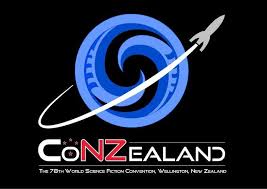

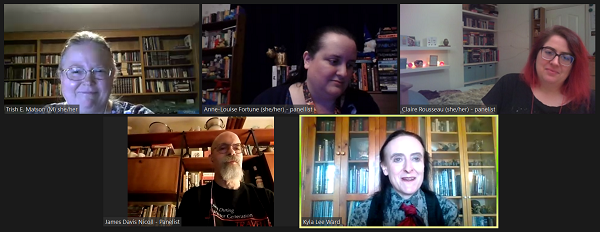
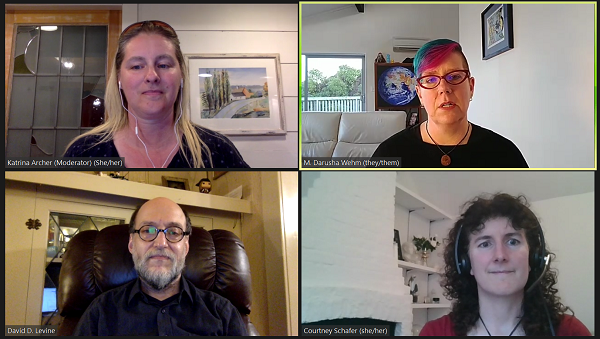
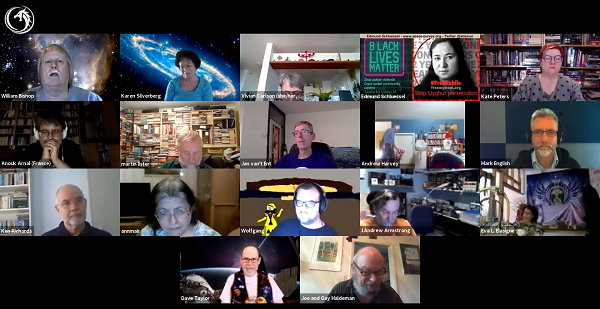
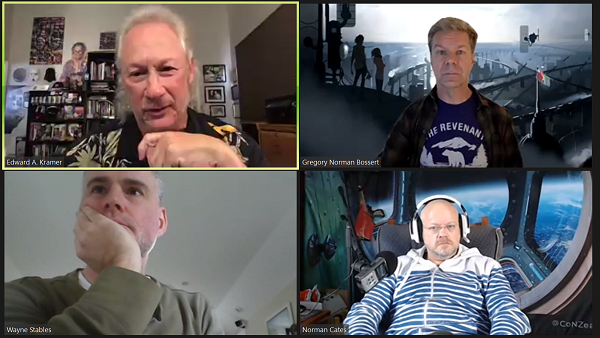

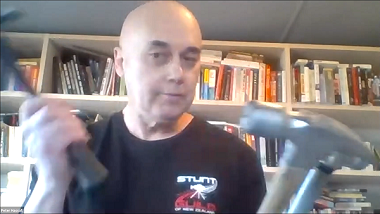
![A Chat with Bob [Silverberg] and George [R.R. Martin] A Chat with Bob [Silverberg] and George [R.R. Martin]](/_media/reviews/events/conzealand_bob_and_george.png)

